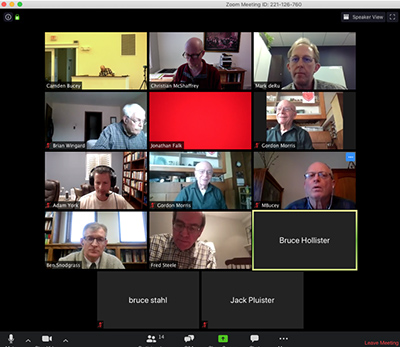Covid-19 is not the first pathogen to sweep across the planet with destructive power, but this coronavirus (the more common name) has caused a global pandemic and brought most of our society to a standstill in the last couple weeks. How should Christians and churches respond to the sudden onset of coronavirus and all the social distancing measures being taken to slow its spread?
I am confident that the answers to this question will continue to improve as we better understand the severity and duration of the Covid-19 problem. Yet, even as the crisis escalates, there are things we know.
Coronavirus has changed everything … at least for a time. Christians and churches should not minimize or dismiss this sudden interruption. We can accept it as part of God’s inscrutable providence and part of the God-ordained reality in which we are called to live. The acceptance of this sudden health crisis includes the precautions we take and the ways we respond to our civil authorities whom God has given for our good. (See once again Rom. 13:1–7.)
Fortunately, God is unchanging, and he sovereignly rules over this world and all of its public health crises. This is certainly consistent with what the Bible says about God’s governance of the world and all its elements in places like Psalm 104 or Psalm 148. The spread of coronavirus will likely help us to pay greater attention to God’s word as we read of other plagues, pestilences and diseases which have served God’s purpose in ages past (for example, 2 Sam. 24:10–17, the pestilences of the prophet Jeremiah, the plagues of Zechariah 14, or worldwide judgment in Rev. 6:8). But then also notice what Psalm 91 promises for those seeking refuge in the Lord: protection from plague and pestilence.
If God can use even these frightening pathogens of the past (and a few more in the future) to accomplish his good purposes, he will do it again with Covid-19. God alone is beyond the reach of this temporal world. He will bring glory to himself in the demonstration of his power and goodness during the duration of coronavirus—however long it lasts. Nothing happens but that which our God has decreed, and all his works show his glory.
We can be thankful for the many technologies available today. Already God’s common grace is apparent in this health crisis as courageous and skilled medical professionals step in to help the sick and provide resources for greater public health. Let us pray for the amazing men and women on the front-lines who are fighting the coronavirus. Some of them are even believers from our own churches who will need God’s sustaining grace and wisdom for this important work in the days ahead.

Another form of technology has also suddenly become central to church life—video meetings on the internet (the Presbytery of the Midwest pictured to the right at a recent online meeting). As soon as there were public warnings about large gatherings, pastors and elders and other church leaders intuitively responded by moving worship services online during the month of March. Today many churches in the OPC and around the Christian world have initiated either pre-recorded services for their churches or other forms of live-streaming Lord’s day worship for those social distancing at home. While this is not ideal under ordinary circumstances, it is far better than the alternative of no services at all for God’s people as we wait for the crisis to end. The continuing ministry of the word and the chance to join our voices in praise has been a great help in my local congregation.
If you don’t know where to find a good worship service to guide you in your worship this Sunday, contact a local OPC congregation, and we will help you find a way to worship the Lord in Spirit and in truth even while you continue to live under strict social distancing during this time of voluntary isolation or shelter at home mandates.
But there is one more extremely important response we need to consider.
The Gospel ministry is needed in new ways during this strange new experience. For some, the Gospel ministry will be needed to bring spiritual hope and comfort in the face of serious disease or even death. We remember the Lord Jesus Christ is the first fruits of eternal life for God’s people (see Revelation 1:17–18), even as a deadly disease reminds us of our mortality and fragility. 2 Corinthians 4:7–12 reminds us that the experience of various forms of death only impresses upon us the hope of life in Christ, and this life in Christ is eternal (2 Corinthians 4:18).
Our neighbors will also need many forms of loving concern and sincere witness as they experience the mounting tolls of fear, isolation, financial struggles, unemployment, and perhaps even the deadly disease itself. This will take wisdom and grace to show the love of Christ and bring the good news of Christ during a time of spreading disease all around us. However, empowered by the Spirit, we trust God to show us how we can do this to exalt the One who bore our diseases (Matthew 8:7) and triumphed over death (1 Corinthians 15:54b–57) in His finished work at Calvary.
Finally, the church in America and around the world will needs to be ready to respond to a world in need. Public health emergencies inevitably cause the greatest destruction among the most vulnerable such as the poor and the oppressed. May the Lord show us how we can be a part of ministering to the urban poor, orphans, refugees, prisoners, and others who live in constant need as it is. May we see new opportunities for the light of Christ to shine in this dark world until that day when disease, sin and death will be no more.
Note: You can find hundreds of recorded sermons and worship services from OPCs around the country HERE.
© 2024 The Orthodox Presbyterian Church